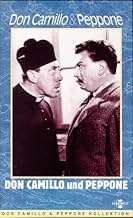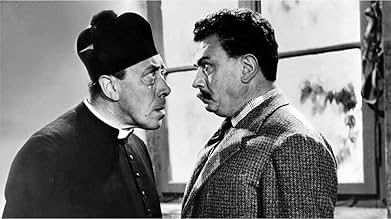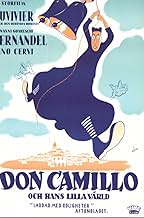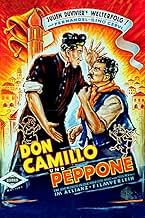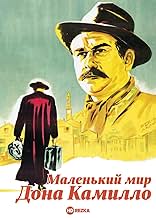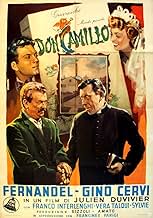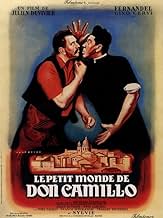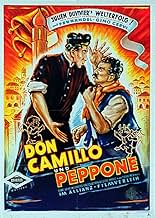NOTE IMDb
7,6/10
5,1 k
MA NOTE
Un prêtre déterminé et un maire communiste développent une amitié réticente malgré leur rivalité officielle.Un prêtre déterminé et un maire communiste développent une amitié réticente malgré leur rivalité officielle.Un prêtre déterminé et un maire communiste développent une amitié réticente malgré leur rivalité officielle.
- Réalisation
- Scénario
- Casting principal
- Nomination aux 1 BAFTA Award
- 3 victoires et 3 nominations au total
Vera Talchi
- Gina Filotti
- (as Vera Talqui)
Charles Vissières
- Il Vescovo
- (as Charles Vissiere)
Clara Auteri Pepe
- Woman saying 'Viva Peppone!'
- (as Clara Auteri)
Manuel Gary
- Il delegato
- (as Manoel Gary)
Avis à la une
...Actually, of all those adjectives, `Italian' was the first to leap to mind. I can't believe the IMDb has decided to classify this film under a French name. `Things happen there that could happen nowhere else in the world,' says the narrator. It's easy to believe.
The Catholics and the communists are battling for the soul of a small village. It's to be hoped that neither side ever wins. Nor is it likely that either side ever will win. This would spoil everyone's fun.
The communist mayor, is, so to speak, the Anglican of the two: someone who will gruffly talk about burning all the capitalists, while letting it be understood that he doesn't really intend his words to be taken literally. The priest (Don Camillo) is hot-headed, as fiercely loyal to the Catholic Church as the mayor is to his party, at once highly intelligent and preternaturally simple minded. He's the kind of Catholic who avoids absurdity by the time-honoured trick of simply not thinking about the doctrines to which he officially subscribes. His `prayers' are impromptu conversations with Jesus, or perhaps simply with the icon of Jesus that hangs on his wall - whichever it is, the film humours his fancy by having Jesus (or the icon) talk back to him. To this day I'm not sure if Jesus (or the icon) is REALLY talking back, or if it's just Don Camillo's imagination. What does it matter? It is, after all, no more than a private eccentricity. It's not as if he talks to or about Jesus in PUBLIC.
No one - not atheists, not communists, not Christians, not Norse pagans - could object to the film's big-hearted fantasy, or fail to like either of the two very likeable protagonists. I gather there are several sequels: the one I've seen isn't nearly as good; and the original feels so much like an archetype that I suspect any sequel would be little more than a footnote.
The Catholics and the communists are battling for the soul of a small village. It's to be hoped that neither side ever wins. Nor is it likely that either side ever will win. This would spoil everyone's fun.
The communist mayor, is, so to speak, the Anglican of the two: someone who will gruffly talk about burning all the capitalists, while letting it be understood that he doesn't really intend his words to be taken literally. The priest (Don Camillo) is hot-headed, as fiercely loyal to the Catholic Church as the mayor is to his party, at once highly intelligent and preternaturally simple minded. He's the kind of Catholic who avoids absurdity by the time-honoured trick of simply not thinking about the doctrines to which he officially subscribes. His `prayers' are impromptu conversations with Jesus, or perhaps simply with the icon of Jesus that hangs on his wall - whichever it is, the film humours his fancy by having Jesus (or the icon) talk back to him. To this day I'm not sure if Jesus (or the icon) is REALLY talking back, or if it's just Don Camillo's imagination. What does it matter? It is, after all, no more than a private eccentricity. It's not as if he talks to or about Jesus in PUBLIC.
No one - not atheists, not communists, not Christians, not Norse pagans - could object to the film's big-hearted fantasy, or fail to like either of the two very likeable protagonists. I gather there are several sequels: the one I've seen isn't nearly as good; and the original feels so much like an archetype that I suspect any sequel would be little more than a footnote.
This movie is so much fun to watch! Tells us the story of Don Camillo, a Roman Catholic priest in a small Italian parish. Life in the village is change forever when Peppone, the communist mayor, is elected. The two are put one against the other. And what follows is a wacky list of situations! What I like most about this movie, it's the simple way it puts things. You can actually believe that this village exists and that what's being told in the movie really happened.
Fernandel is great as Don Camillo, the hot-headed priest. And Gino Cervi shines in the role of Peppone. See this one, you won't regret it. Fun from beginning to end!
Out of 100, I gave it 87. That's good for ***½ out of ****.
Seen at home, in Toronto, on September 1st, 2002.
Fernandel is great as Don Camillo, the hot-headed priest. And Gino Cervi shines in the role of Peppone. See this one, you won't regret it. Fun from beginning to end!
Out of 100, I gave it 87. That's good for ***½ out of ****.
Seen at home, in Toronto, on September 1st, 2002.
I think this is a very funny movie, Despite the fact it is a white&black film and you really can tell that it is placed on a certain time frame (end of 1940's - early 1950's), the plot is fun and universal. It gives you a glimpse of the life on a small Italian town, where simple things turns into hilarious situations, thanks to the strange relationship of friendship/rivalry between Don Camillo and Mayor Peppone. I was lucky to see the original french version (subtitled, of course) which is always better than hearing a translated version. I think that original voices -even if you do not understand the language- reveal the character's feelings, and give credibility to actor's performances. After the film, you get the impression that life is somewhat easier to cope with...
Fernandel is Don Camillio, the reactionary village priest. Gino Cervi is Giuseppe 'Peppone' Bottazzi, the communist mayor and the fierce opponent of of Camillio. In their own little world, they engage in a fierce and time-honored struggle for the hearts, minds, souls and well-being of their community. Cervi has his organization and supporters. Camillio only only the voice of G*d to narrate the events and to reproach him when he fails in his work; however, since it's Orson Welles' voice, the honors are more than even in this loving little film by Julien Duvivier.
It's an odd film from Duvivier, whose movies often celebrated the unseen hand of fate, leading men to destruction. Yet in this movie, everyone knows who they are and what is important, even if they disagree fiercely. So the old teacher rails against stupidity and hopes for a pension; the young lovers re-enact Romeo and Juliet; and the communist brings his newborn child to be baptized as Giuseppi Stalin.
Perhaps it is the inherent humility of these people that makes Duvivier adore them. They do not fight their fates, but recognizing it, do their best within it. Duvivier made a sequel, and Fernandel repeated the role four times, his lugubrious face making him the perfect parish priest.
It's an odd film from Duvivier, whose movies often celebrated the unseen hand of fate, leading men to destruction. Yet in this movie, everyone knows who they are and what is important, even if they disagree fiercely. So the old teacher rails against stupidity and hopes for a pension; the young lovers re-enact Romeo and Juliet; and the communist brings his newborn child to be baptized as Giuseppi Stalin.
Perhaps it is the inherent humility of these people that makes Duvivier adore them. They do not fight their fates, but recognizing it, do their best within it. Duvivier made a sequel, and Fernandel repeated the role four times, his lugubrious face making him the perfect parish priest.
I have recently watched so many American gangster and noir films that I felt I needed something different for a change. What better than a French-Italian co-production from the immediate post-war period? It got to be 'The Little World of Don Camillo'. Fernandel plays the eponymous priest of a small town in Northern Italy who is the friend and enemy of the newly elected communist mayor 'Peppone' Bottazzi (Gino Cervi with a moustache that makes him look like Stalin). The film, set in 1946, concerns Camillo and Peppone's friendly quarrels about how best to serve their little town (the 'little world' of the title): they want the same things but differ about the best ways to get them. Director Julien Duvivier has adapted episodes from Guareschi's novel and cleverly intervove them so that they make up a charming and amusing whole: a film that's heartwarming and funny, though there are no moments when you laugh out loud. Fernandel is outstanding and Cervi does very well as his frenemy. The picture is interesting non the least because it offers a glimpse of life in post-war Italy and an insight into the political and social atmosphere of the time. Highly recommended!
Le saviez-vous
- AnecdotesThe whole film was shot twice; there is a French and an Italien negative, that can be distinguished by details in editing and content (watch the position of the dog during the procession for example).
- Citations
Crocefisso: Where did you get that cigar, Camillo?
Don Camillo: Peppone had two. I think I took it without asking him. You know he believes in equal distribution of wealth.
- Versions alternativesGerman version runs 2 minutes shorter than the Italian original version.
- ConnexionsFeatured in Cinema forever - Capolavori salvati (2001)
Meilleurs choix
Connectez-vous pour évaluer et suivre la liste de favoris afin de recevoir des recommandations personnalisées
- How long is The Little World of Don Camillo?Alimenté par Alexa
Détails
- Date de sortie
- Pays d’origine
- Langues
- Aussi connu sous le nom de
- The Little World of Don Camillo
- Lieux de tournage
- Sociétés de production
- Voir plus de crédits d'entreprise sur IMDbPro
- Durée1 heure 47 minutes
- Couleur
- Rapport de forme
- 1.37 : 1
Contribuer à cette page
Suggérer une modification ou ajouter du contenu manquant

Lacune principale
By what name was Le Petit Monde de don Camillo (1952) officially released in India in English?
Répondre
